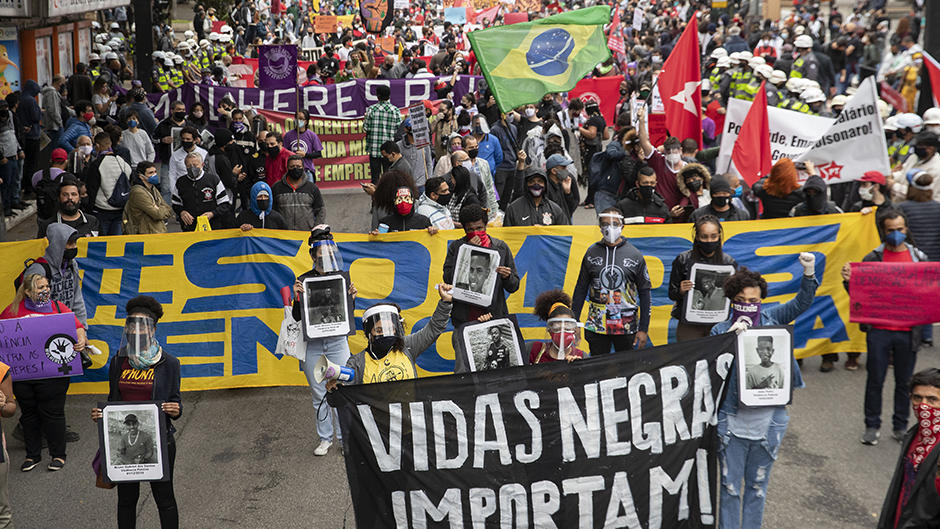The death of George Floyd has sparked protests all over the world, including several in the streets of Brazil where the deaths of two black children also fueled opposition to racism and police brutality.
In May, a 14-year-old boy was killed in his home in a favela (shantytown) in Rio de Janeiro by police in a botched police raid. In early June, a 5-year-old boy fell to his death in Recife after his mother, who was a domestic, left him in the care of her white employer, who did not supervise the child.
“These two events happened close together and represent the structural violence against the Afro-Brazilian community,” said Tracy Devine Guzmán, associate professor of Latin American Studies at the University of Miami. “What is happening in the U.S. has made a lot of people also pay attention to what is happening in Brazil.”
To many, the protests in Brazil are surprising because for decades the country has prided itself on not discriminating by race. To be a Brazilian meant that you were the color of café com leite (Portuguese for coffee with milk) and everybody was mixed, so racial tension was not something of concern, said Michael Touchton, assistant professor of political science.
Statistics show that Afro-Brazilians, who make up more than 50 percent of the 209.5 million people in the country, fare worse in every economic measurement—education, health, and job opportunities. And, they are often targeted for police violence.
“A killing in a favela happens all the time and it does not even make the news,” said Touchton. “I think a lot of people are saying ‘enough, we cannot have kids being shot and killed for no reason.’ ”
Police brutality against Afro-Brazilians is rampant and there is nearly complete impunity for the police crimes, said the University of Miami experts. In 2019, Rio de Janeiro had more than 1,800 victims of state violence. In the first half of that year alone, 80 percent of the victims were black and in economically marginalized circumstances, said Devine Guzmán. Impacted families are often hesitant to speak out or testify for fear of violent retribution.
“Racism is so deeply rooted that it is hard to dissect with precision,” said Devine Guzmán.
Brazil, the largest country in South America, was the last country in the western world to abolish slavery in 1888. It is estimated that there were more than 4 million slaves imported to the country.
Although there were no Jim Crow laws set up in Brazil to enforce segregation, there was a class structure that discriminated against the Afro-descendants. Laws forbid the practice of candomblé, a religion derived from Africa, and capoeira, an Afro-Brazilian martial art created by the slaves.
The educational system also discriminated against the poorest in the society.
“People with means sent their children to private primary and secondary schools,” said Devine Guzmán. “These children were able to get into good public universities, which were out of reach for many of the poorer segments of society.”
Affirmative action measures implemented controversially during the previous administration have only begun to modify this structural exclusion, she said.
Devine Guzmán pointed out that the protesters want more accountability for police actions. According to both University experts, the running narrative in Brazilian society when someone is killed by police is that the person was involved in drugs. Police reports on such incidents are often incomplete or sketchy, and police officers are rarely prosecuted or tried in court.
“One of the changes is that people are not going to be willing to accept this level of impunity,” Devine Guzmán remarked.
Underlining the racial tensions is the coronavirus, which has affected Brazil immensely. As of June 22, the country has had more than 50,000 deaths attributed to COVID-19, according to the Coronavirus Resource Center at Johns Hopkins University of Medicine.
A contributing factor to the crisis was the Brazil president’s reaction to the pandemic. Jair Bolsonaro first underplayed the virus and refused to order a shutdown of the country’s major cities, which made the number of cases skyrocket past 1 million, second only to the U.S.
Most of the sick and deceased are “disproportionally people of color and poor people,” said Devine Guzmán. “These poor people are dying from this disease because they don’t have the privilege of staying home.”

